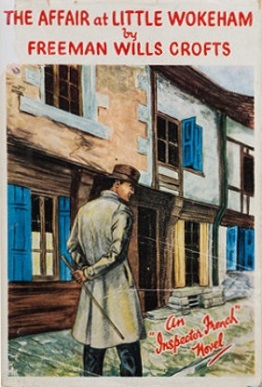
The Affair at Little Wokeham is a 1943 detective novel by the Irish writer Freeman Wills Crofts. It is the twenty-fourth in his series of novels featuring Inspector French, a prominent figure of the Golden Age of Detective Fiction. It was published in the United States under the alternative title of Double Tragedy.

Up the Garden Path is a 1949 detective novel by John Rhode, the pen name of the British writer Cecil Street. It is the forty ninth in his long-running series of novels featuring Lancelot Priestley, a Golden Age armchair detective. It was published in America by Dodd Mead under the alternative title The Fatal Garden. Reviewing the novel in The Observer, Maurice Richardson concluded "Mr. Rhode has lost very little of his grip."

The Paper Bag is a 1948 detective novel by John Rhode, the pen name of the British writer Cecil Street. It is the forty sixth in his long-running series of novels featuring Lancelot Priestley, a Golden Age armchair detective. It was published in America by Dodd Mead under the alternative title The Links in the Chain.

The Telephone Call is a 1948 detective novel by John Rhode, the pen name of the British writer Cecil Street. It is the forty-seventh in his long-running series of novels featuring Lancelot Priestley, a Golden Age armchair detective. It was published in America by Dodd Mead under the alternative title Shadow of an Alibi. It is based on the real-life Wallace Case of 1931 in which William Herbert Wallace was convicted of murdering his wife Julia, a conviction which was later overturned on appeal.
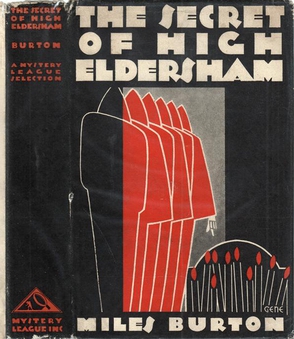
The Secret of High Eldersham is a 1930 detective novel by Miles Burton, the pen name of the British writer Cecil Street. It was the first novel in a lengthy series featuring the detective Desmond Merrion. Street was one of the most prolific authors of the Golden Age of Detective Fiction and had already enjoyed success with his Doctor Priestley series, written under the name of John Rhode. In 1931 it was published in the United States by the Mystery League under the altered title The Mystery of High Eldersham. Originally published in Britain by the Collins Crime Club, it was reissued in 2016 by British Library Publishing as part of a series of crime novels the Golden Age.

The Claverton Mystery is a 1933 detective novel by John Rhode, the pen name of the British writer Cecil Street. It is the fifteenth in his long-running series of novels featuring Lancelot Priestley, a Golden Age armchair detective. It was published in the United States by Dodd Mead with the altered title The Claverton Affair. The tone of the book has been described as much darker than the author's other novels.

Anything to Declare? is a 1957 detective novel by Freeman Wills Crofts. It is the twenty ninth and final entry in his series of novels featuring Inspector French, a prominent figure of the Golden Age of Detective Fiction. The author had been in poor health for much of the decade, and struggled to finish this book which was published a few weeks before his death.

They Watched by Night is a 1941 detective novel by John Rhode, the pen name of the British writer Cecil Street. It is the thirty fifth in his long-running series of novels featuring Lancelot Priestley, a Golden Age armchair detective. It was published in the United States by Dodd Mead with the alternative title Signal for Death.

Dead Men at the Folly is a 1932 detective novel by John Rhode, the pen name of the British writer Cecil Street. It is the thirteenth in his long-running series of novels featuring Lancelot Priestley, a Golden Age armchair detective. It was published in the United States by Dodd Mead.

Common Sense Is All You Need is a 1947 detective novel by the British author Alfred Walter Stewart, published under his pseudonym J.J. Connington. It was his last novel, published by Hodder and Stoughton the year of his death, and featured his regular character Sir Clinton Driffield. It was the seventeenth in a series of novels featuring Driffield, a Chief Constable of a rural English county, published during the Golden Age of Detective Fiction. Although published during the postwar era. it is set during the Second World War with German bombing raids taking place.

For Murder Will Speak is a 1938 detective novel by the British author Alfred Walter Stewart, published under his pseudonym J.J. Connington. It is the thirteenth in a series of novels featuring the Golden Age Detective Chief Constable Sir Clinton Driffield. The title references a line from Shakespeare's Hamlet. It was released in the United States by Little, Brown and Company under the alternative title Murder Will Speak.

Mystery at Lynden Sands is a 1928 detective novel by the British author Alfred Walter Stewart, published under his pseudonym J.J. Connington. It is the third in a series of novels featuring the Golden Age Detective Chief Constable Sir Clinton Driffield. It was published in London by Gollancz and Boston by Little, Brown and Company. It received a generally positive critical reception, with one reviewer going so far as to say it "may just fail of being the best detective story of the century" comparing it to The Cask and The Mysterious Affair at Styles. In A Catalogue of Crime by Jacques Barzun and Wendell Hertig Taylor describe it as "early but not first-class Connington".

Tragedy at Ravensthorpe is an 1927 detective novel by the British writer Alfred Walter Stewart, published under his pseudonym J.J. Connington. It is the second in a series of seventeen novels featuring the Golden Age Detective Chief Constable Sir Clinton Driffield following on from Murder in the Maze. The American edition was published in Boston by Little, Brown and Company.
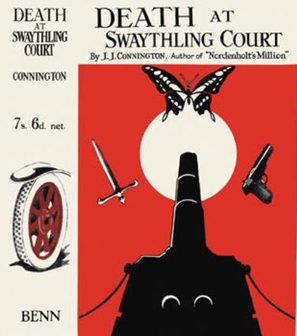
Death at Swaythling Court is a 1926 mystery detective novel by the British writer Alfred Walter Stewart, published under his pseudonym J.J. Connington. It was Stewart's first attempt at a detective novel, having previously produced works including the 1923 science fiction novel Nordenholt's Million. It is a stand-alone novel, revolving around a country house mystery. The following year the author published Murder in the Maze, the first of seventeen novels featuring the Golden Age detective Sir Clinton Driffield, for which he is best-known.

The Boathouse Riddle is a 1931 detective novel by the British author Alfred Walter Stewart, published under his pseudonym J.J. Connington. It is the sixth in his series of seventeen novels featuring the Golden Age Detective Chief Constable Sir Clinton Driffield. The title is also written as The Boat-House Riddle.
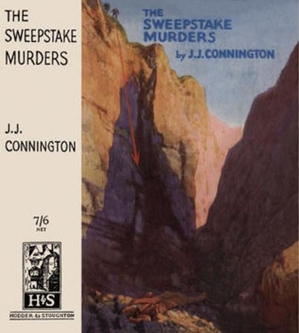
The Sweepstake Murders is an 1931 detective novel by the British author Alfred Walter Stewart, published under his pseudonym J.J. Connington. It is the seventh in his series of novels featuring the Golden Age Detective Chief Constable Sir Clinton Driffield. It uses a tontine murder theme, which recurs in detective and mystery stories.
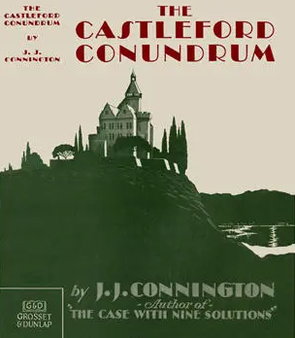
The Castleford Conundrum is a 1932 detective novel by the British author Alfred Walter Stewart, published under his pseudonym J.J. Connington. It is the eighth in his series of novels featuring the Golden Age Detective Chief Constable Sir Clinton Driffield, the Chief Constable of a rural English county.
Sir Clinton Driffield is a fictional police detective created by the British author J.J. Connington. He was one of numerous detectives created during the Golden Age of Detective Fiction, making his first appearance in Murder in the Maze in 1927. He appeared in four subsequent novels by 1929 when Connington apparently wished to write him out following Nemesis at Raynham Parva. However, his replacement Superintendent Ross failed to gain the same level of popularity over two novels and Sir Clinton returned in the 1931 mystery The Boathouse Riddle. He went on to appear in a further eleven novels. The last entry Common Sense Is All You Need was published the year of Connington's death in 1947 and is set in wartime Britain.

A Minor Operation is a 1937 British detective novel by the British author Alfred Walter Stewart, published under his pseudonym J.J. Connington. It is the eleventh in a series of novels featuring the Golden Age Detective Chief Constable Sir Clinton Driffield and was published by Hodder and Stoughton in London and Little, Brown and Company in the United States. In a New York Times review Isaac Anderson noted Sir Clinton as being rare amongst Chief Constables in British mystery stories for his competence noting "If you have not previously met him in Mr. Connington’s other novels, this is a good time to make his acquaintance, for in this book you will see him at his best".
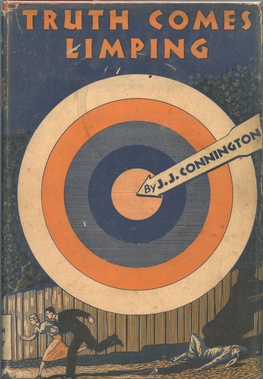
Truth Comes Limping is a 1938 mystery detective novel by the British author Alfred Walter Stewart, published under his pseudonym J.J. Connington. It is the twelfth in a series of seventeen novels featuring the Golden Age Detective Sir Clinton Driffield, the Chief Constable of a rural English county. It was published by Hodder and Stoughton in London and Little, Brown and Company in the United States.



















